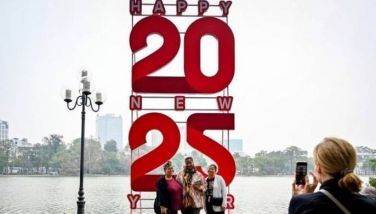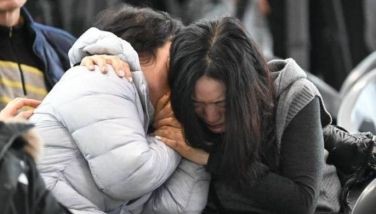As Taiwan polls loom, China warns of new challenges ahead
BEIJING — China on Thursday warned of a serious disruption of ties with Taiwan as the island's voters appear set to elect a new president with a far more skeptical view of dealings with Beijing.
The year ahead is bringing "complex changes" and the sides face "new challenges," the director of the Cabinet's Taiwan Affairs Office, Zhang Zhijun, said in a New Year's greeting to Taiwan's 23 million people.
Recalling the progress in relations made over the past seven-plus years under Taiwan's China-friendly President Ma Ying-jeou, Zhang said he hoped Taiwanese realize those gains could evaporate if the island defies China's insistence that it remains a part of the Chinese nation.
"We don't want to wait until the street light goes out to appreciate the illumination it has brought, or to wait until the fruits of peaceful development are lost to appreciate their value," Zhang said.
Democratic Progressive Party candidate Tsai Ing-wen is leading by a broad margin in polls to win the self-governing island's Jan. 16 presidential election. That would hand defeat to the pro-China Nationalists, who have held the office since 2008, although control of the island's legislature remains up for grabs.
While it has yet to comment directly on the election, Beijing, which considers Taiwan a breakaway province, is watching developments closely.
Bitter hostility between the sides has eased considerably over the past two decades, with direct trade and travel links fully established and their economies growing increasingly intertwined.
Though largely symbolic, a historic November summit in Singapore between Ma and Chinese President Xi Jinping was the first meeting between leaders since they split amid civil war in 1949.
Still, China and Taiwan are now moving into a period of uncertainty and it remains unclear exactly how China will respond to a Tsai presidency.
While Beijing has abandoned the direct threats against Taiwanese voters of the past that ultimately backfired, Zhang's warning appeared directed as much at Tsai herself as at the island's populace at large.
While Tsai's DPP backs Taiwan's formal independence — something Beijing says it will respond to with force — she has repeatedly stated her commitment to maintaining the status quo.
However, she has also refused to endorse Beijing's demand that she recognize the island and mainland as part of a single Chinese nation, a fuzzy doctrine known as the "92 Consensus" that formed the basis for ice-breaking talks between the sides more than two decades ago.
She has also sought to address concerns among many on the island who remain highly dubious of Ma's moves toward closer economic integration with China.
"We cannot simply be bound to China," Tsai said. "That's what worries us most about the past eight years — the sense that that's the only choice we have. That's not good for our economy or our security," Tsai said in a debate with her Nationalist Party opponent, Eric Chu, on Sunday.
While the overwhelming majority of Taiwanese voters are moderate in their views, both the hardcore pro-independence and the smaller pro-unification factions occasionally take to the streets or launch other direct actions to press their agendas.
Earlier this week, vandals defaced a pair of replica Chinese Dynasty relics donated to a Taiwanese museum by Hong Kong martial arts actor Jackie Chan, who is disliked by many on the island for his close ties to the Chinese Communist Party and statements denigrating Taiwanese democracy.
Two people were detained on Wednesday over the act, in which the statues were spray-painted with slogans criticizing China's efforts to portray Taiwanese culture as identical to China's own.
- Latest
- Trending































